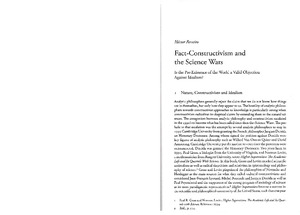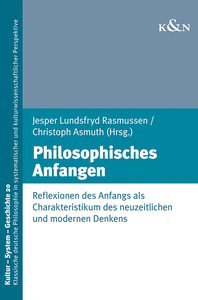Please use this identifier to cite or link to this item:
https://repositorio.uca.edu.ar/handle/123456789/16326| Título: | Fact-constructivism and the science wars | Autor: | Ferreiro, Héctor Alberto | Palabras clave: | FILOSOFIA ANALITICA; CONSTRUCTIVISMO; CIENCIAS NATURALES; RESEÑAS | Fecha de publicación: | 2023 | Editorial: | Königshausen & Neumann | Cita: | Fact-constructivism and the science wars [en línea]. En: Rasmussen, J., Asmuth, C.(eds.). Philosophisches Anfangen. Reflexionen des Anfangs als Charakteristikum des neuzeitlichen und modernen Denkens. Alemania : Königshausen & Neumann, 2023. Disponible en: https://repositorio.uca.edu.ar/handle/123456789/16326 | Proyecto: | Programa de Investigación en Filosofía Clásica Alemana | Resumen: | Resumen: Analytic philosophers generally reject the claim that we do not know how things are in themselves, but only how they appear to us. The hostility of analytic philosophers towards constructivist approaches to knowledge is particularly strong when constructivism radicalizes its skeptical claims by extending them to the natural sciences. The antagonism between analytic philosophy and constructivism escalated in the 1990's to become what has been called since then the >Science Wars<. The prelude to that escalation was the attempt by several analytic philosophers to stop in 1992 Cambridge University from granting the French philosopher Jacques Derrida an Honorary Doctorate. Among whom signed the petition against Derrida were key figures of analytic philosophy such as Willard Van Orman Quine and David Armstrong. Cambridge University put the motion to vote; since the protesters were outnumbered, Derrida was granted the Honorary Doctorate. Two years later, in 1994, Paul Gross, a biologist from the University of Virginia, and Norman Levitt, a mathematician from Rutgers University, wrote Higher Superstition: The Academic Left and Its Quarrels With Science. In this book, Gross and Levitt attacked scientific antirealism as well as radical skepticism and relativism in epistemology and philosophy of science. 1 Gross and Levitt pinpointed the philosophies of Niettsche and Heidegger as the main sources for what they called >cultural constructivism< and considered Jean-Fran<;:ois Lyotard, Michel Foucault and Jacques Derrida as well as Paul Feyerabend and the supporters of the strong program of sociology of science as its most paradigmatic representatives. | URI: | https://repositorio.uca.edu.ar/handle/123456789/16326 | ISBN: | 978-3-8260-7577-3 | Disciplina: | FILOSOFIA | Derechos: | Acceso abierto. 12 meses de embargo | Fuente: | Rasmussen, J., Asmuth, C.(eds.). Philosophisches Anfangen. Reflexionen des Anfangs als Charakteristikum des neuzeitlichen und modernen Denkens. Alemania : Königshausen & Neumann, 2023 |
| Appears in Collections: | Libros/partes de libro |
Files in This Item:
| File | Description | Size | Format | |
|---|---|---|---|---|
| fact-constructivism-science.pdf | 10,38 MB | Adobe PDF |  View/Open | |
| cover-isbn-9783826075773-9783826075773_cover.jpg | 146,36 kB | JPEG |  View/Open |
Page view(s)
39
checked on Apr 27, 2024
Download(s)
14
checked on Apr 27, 2024
Google ScholarTM
Check
Altmetric
This item is licensed under a Creative Commons License

